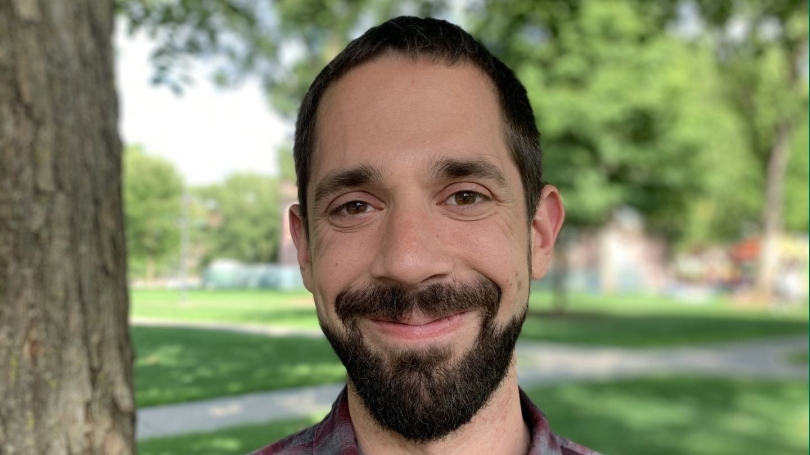What do you consider your hometown, and how has it shaped who you are today?
I grew up in the suburbs of central New Jersey in a town called Brick. It's a very quiet area on the Jersey shore, so I have lots of fond memories visiting the beach in the summer. The proximity to the water inspired me to attend a marine science-focused high school which indirectly led to my graduate research on ocean waves.
Can you tell us about your current research at Dartmouth and what excites you most about it?
I'm currently in the mathematics department working with my incredible mentor, Feng Fu. Together, we're applying evolutionary game theory to simulate how neurons communicate in model brain systems. I'm fascinated by complex dynamical systems—that is, systems that evolve in time in interesting ways. Evolutionary game theory uses the tools of game theory to see how a population evolves over time and is a fascinating type of dynamical system.
What is your academic background? Where did you complete your graduate studies, and what led you to pursue a postdoc?
I actually did my PhD in the physics department, so switching from theoretical physics to mathematics has been very exciting. I completed my graduate studies at UC San Diego under the supervision of two amazing advisors: Falk Feddersen in the oceanography department and John McGreevy in the physics department. There, I studied nonlinear waves in a variety of contexts, such as electron waves in a fascinating material called graphene and ocean waves under the influence of wind. These wave systems have intriguing dynamics and developed my interest in dynamical systems. Since graduating, I've been expanding my field of research to other dynamical systems, such as evolutionary games.
What inspired you to pursue a postdoc position at Dartmouth?
The mathematics department at Dartmouth has a host of incredible faculty working on a broad range of interesting topics. I love thinking about and working on a host of related problems, so I really valued the abundance of applied math research directions being pursued here. Being surrounded by so many different approaches and applications has helped me grow and learn so much since joining this past September.
As a member of the Dartmouth Postdoc Association's executive board, what motivated you to get involved, and what do you hope to accomplish in this role?
I had the great privilege of getting to work with the physics graduate council during my PhD and I got to see first-hand how much positive change a dedicated board can achieve. Being a postdoc brings a host of unique challenges, so supporting my fellow postdocs is a big motivation. The Dartmouth Postdoc Association has already helped me feel welcome in the Dartmouth community, so I'm excited to join the executive board and continue the DPAs valuable work.
What advice would you give to those currently pursuing their PhDs about making the most of their time at Dartmouth?
Pursuing a PhD is a lot of fun, but it can also be stressful at times. Trying to figure out what you want to research and how is a challenging endeavor. To combat this stress, I've found it helpful to allow yourself flexibility in pursuing related, yet different, topics. Dartmouth has so many world-class experts studying a myriad of fascinating ideas. Allow yourself the freedom to be inspired by new and exciting topics.
What are some key skills or experiences you've gained during your postdoc that you think will be valuable in your next career step?
My time as a postdoc has helped me sharpen a number of soft skills necessary for running a lab. I've had the opportunity to organize and host lab meetings, invite external speakers, and apply for grants. Additionally, I've been able to practice balancing research and teaching, all of which are necessary skills for advancing in an academic career.
What are your career goals after your postdoc?
After my postdoc, I plan to apply to faculty positions to continue my research at the intersection of mathematics and physics. I hope to continue mentoring undergraduate and graduate students in dynamical systems research. And I love teaching students about the joy and beauty of mathematics.
For prospective postdocs considering Dartmouth, what would you say are the biggest benefits of being part of this community?
The community at Dartmouth is incredible supportive: not only do we have a group of postdocs, we are supported by some fantastic Dartmouth staff. For instance, our director of postdoc affairs, Cindy Rosalbo, is an invaluable ally and has done so much to enable the Dartmouth postdocs to achieve success. There are countless people on campus who are helping us to make our time at Dartmouth valuable and enjoyable.
Beyond research, what hobbies or activities do you enjoy in the Upper Valley?
I have really enjoyed getting to explore the surrounding towns and take part in community events. Between trivia night with fellow postdocs, snowshoeing with my partner at a local ski lodge, and visiting ice castles in the White Mountains, there's been so much to do!
